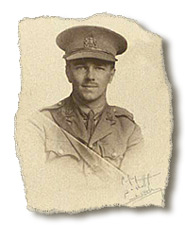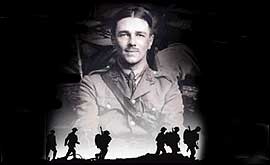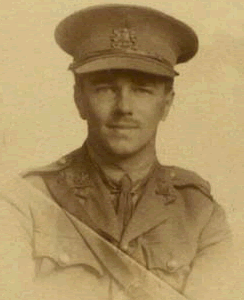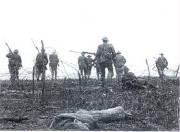|
Wilfred Owen.1893-1918

Wilfred Edward Salter Owen was born on 18th March 1893 in Oswestry, Shropshire, son of Tom
and Susan Owen. After the death of his grandfather in 1897 the family moved to Birkenhead (Merseyside). His education began
at the Birkenhead Institute, and then continued at the Technical School in Shrewsbury when the family were forced to move
there in 1906-7 when his father was appointed Assistant Superintendent for the Western Region of the railways. Already displaying
a keen interest in the arts, Owen's earliest experiments in poetry began at the age of 17. After failing to attain entrance
to the University of London, he spent a year as a lay assistant to the Revd. Herbert Wigan at Dunsden before leaving for Bordeaux,
France, to teach at the Berlitz School of English. During the latter part of 1914 and early 1915 Owen became increasingly
aware of the magnitude of the War and he returned to England in September 1915 to enlist in the Artists' Rifles a month later.
He received his commission to the Manchester Regiment (5th Battalion) in June 1916, and spent the rest of the year training
in England.1917 in many ways was the pivotal year in his life, although it was to prove to be his penultimate. In January
he was posted to France and saw his first action in which he and his men were forced to hold a flooded dug-out in no-man's
land for fifty hours whilst under heavy bombardment. In March he was injured with concussion but returned to the front-line
in April. In May he was caught in a shell-explosion and when his battalion was eventually relieved he was diagnosed as having
shell-shock ('neurasthenia'). He was evacuated to England and on June 26th he arrived at Craiglockhart War Hospital near Edinburgh. Had Owen not arrived at the hospital at that time one wonders what might
have happened to his literary career, for it was here that he met Siegfried Sassoon who was also a patient. Sassoon already had a reputation as a poet and after
an awkward introduction he agreed to look over Owen's poems. As well as encouraging Owen to continue, he introduced him to
such literary figures as Robert Graves (a friend of Sassoon's) which in turn, after his release from hospital, allowed Owen
to mix with such luminaries as Arnold Bennett and H. G. Wells. The period in Craiglockhart, and the early part of 1918, was
in many ways his most creative, and he wrote many of the poems for which he is remembered today. In June 1918 he rejoined
his regiment at Scarborough and then in August he returned to France. He was awarded the Military Cross for bravery at Amiens,
but was killed on the 4th November whilst attempting to lead his men across the Sambre canal at Ors. The news of his death reached his parents on November 11th 1918,
the day of the armistice.
 |
 |
|

|
|
8th December 1917
Bent double, like old beggars under sacks,
Knock-kneed, coughing like hags, we cursed through sludge,
Till
on the haunting flares we turned our backs
And towards our distant rest began to trudge.
Men marched asleep. Many had
lost their boots
But limped on, blood-shod. All went lame; all blind;
Drunk with fatigue; deaf even to the hoots
Of
tired, outstripped Five-Nines that dropped behind.
Gas! Gas! Quick, boys!-An ecstasy of fumbling,
Fitting the clumsy helmets just in time;
But someone
still was yelling out and stumbling
And flound'ring like a man in fire or lime...
Dim, through the misty panes and thick
green light,
As under a green sea, I saw him drowning.
In all my dreams, before my helpless sight,
He plunges at me, guttering, choking, drowning.
If in some smothering dreams you too could pace
Behind the wagon that we flung him in,
And watch the
white eyes writhing in his face,
His hanging face, like a devil's sick of sin;
If you could hear, at every jolt, the
blood
Come gargling from the froth-corrupted lungs,
Obscene as cancer, bitter as the cud
Of vile, incurable sores
on innocent tongues,-
My friend, you would not tell with such high zest
To children ardent for some desperate glory,
The
old Lie: Dulce et decorum est
Pro patria mori
|
|
 |
 |
|
 |
|
 |
 |
|

|
| . |
|
|
Listen to readings of Owen's poem
'The Sentry', and to extracts from
a letter written to his mother in
January 1917. fromm the BBC
-Wilfred Owen and his
Early Editors
Wilfred Owen is considered by
many to be perhaps the best
war poet in English, if not world,
literature. Yet, at the time of his
death on November 4, 1918, only five
of his poems had been published
his life, a virtual tour of WW I sites
associated with Owen, plus texts
of his poems, plus alot more
Browse Owen's Manuscripts,
Photographs and Film Clips
of the Western Front, and
Audio Clips from interviews
with veterans. at the
Oxford University English
Faculty Library website
|
|
 |
 |
 |
 |
|

|
| a frame from the 1916 British propaganda film The Battle of The Somme, which was filmed on sets |
|
|
related internet links
a page from our
Walk Awhile website
Coope, Boyes & Simpson and
Wak Maar Proper.
Christmas Truce -
Kerstbestand (NMCD14)
Released: 1 November 1999.
A new album of live recordings of
Coope Boyes & Simpson
and sixty piece Flemish choir
with traditional carols and songs
written specially for this
Christmas Peace Concert.
First performed in Ypres Cathedral.
from the BBC
WW.1 Archives
the official memorial
website
officially the third battle
of Ypres
from the BBC's
WW.1 Archives
Panta Rhei, Coope, Boyes & Simpson,
Passchendaele Suite (NMCD10)
From the award winning
series of
Peace Concerts albums
A unique combination of songs,
voices and instruments.
CD plus illustrated booklet.

|
|
 |
 |
|
 |
|
|
 |
|
|
|

